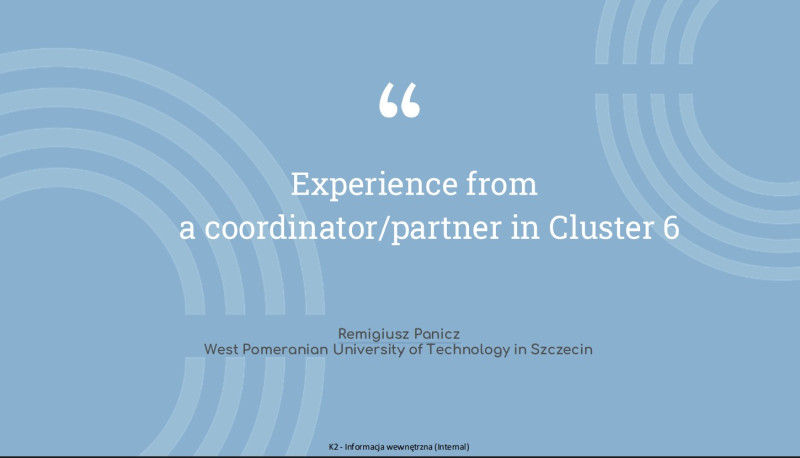5_experience-from-a-coordinatorpartner-in-cluster-6_panicz.pdf
This presentation is about the experience of Remigiusz Panicz from the West Pomeranian University of Technology in Szczecin, Poland, as a coordinator/partner in Cluster 6 (Food, Bioeconomy, Natural Resources, Agriculture and Environment) projects within the Horizon Europe framework.
Here’s a breakdown of key points from the presentation
- How to Become a Consortium Member:
- Apply the multi-task approach as early as possible.
- Cooperate with local centers for innovation and technology transfers.
- Communicate and disseminate activities/results.
- Embed mobility from the start.
- Be flexible, curious, and open-minded.
- Have a business partner for co-creation and co-testing of ideas.
- Work hard.
- Challenges Encountered:
- Evolving, excessive, and unreasonable bureaucracy in Poland.
- Budget issues (inflation, salary costs, auxiliary costs).
- Dependence on prior trials' outputs.
- Time scale, weather conditions, and COVID-19 lockdowns.
- Straightforward Elements of Projects:
- Friendly and fair application process.
- Reporting of expenditures, progress, and results.
- Communication with the Project Officer and the funding body.
- Audit (generally non-problematic).
- Execution of the project (in general).
- Building a Successful Consortium:
- Join or create a group of partners.
- Have a real leader from the beginning.
- Start with an experienced core team.
- Know each other well.
- Consider the call's objectives and key elements.
- Include other contributors/partners.
- Be inclusive and search for transversalities.
- Ensure partners are experts.
- Focus on exploitation.
- Delivering on Promises:
- Start activities early if possible.
- Communicate key issues to the lead.
- Don't assume others know your project's needs.
- Actively contribute to meetings.
- Set up internal communication infrastructure.
- Monitor IPR, DMP, etc.
- Local Environment Support:
- Key insights for initiating and building a consortium.
- Examples of good practices in cross-border partnerships.
- Matchmaking for future calls.
- Communication of institutional capabilities to attract partners.

Corporate author(s): West Pomeranian University of Technology in Szczecin
Author(s): Remigiusz Panicz
Collection: Training content
Subjects: CARE4BIO
Themes: Cluster 6 Food, Bioeconomy, Natural Resources, Agriculture and Environment, Pillar 2
Used in
How to Approach Cluster 6 Funding Opportunities
Content Type: Training
Network: Cluster 6 Date: 28/05/2025
How approach Cluster 6 funding opportunities. On-Site: Warsaw
Content Type: Stage
Network: Cluster 6 Date: 28/05/2025
You may also be interested in
Federica Tanghetti of NCP_WIDERA.NET delivered a presentation outlining crucial support mechanisms for Horizon Europe applicants from Widening countries focusing on Pillar II calls. She detailed how NCP_WIDERA.NET works to bridge knowledge gaps and improve access to funding opportunities throug...
Date: 09/06/2025 Collections: Training content
Published by: Cluster 6
Date: 24/03/2025 Collections: Templates & guidelines
Published by: Cluster 6
Date: 24/03/2025 Collections: Templates & guidelines
Published by: Cluster 6
Date: 24/03/2025 Collections: Templates & guidelines
Published by: Cluster 6
Date: 24/03/2025 Collections: Templates & guidelines
Published by: Cluster 6
This deliverable 3.7 “Publication and update of Stakeholders Map” is part of Task 3.4 “Synergies with other key stakeholders”. It provides an overview of the Cluster 6 direct and wider environment and collects stakeholders such as respective Missions and European Partnerships, relevant synergistic p...
Date: 31/01/2023 Collections: Deliverables
Published by: Cluster 6
This document sets out the context and overview of the policies relevant to Horizon Europe’s Cluster 6. It outlines how there is a coherent and logical approach to R&D priorities and funding. In turn that research goes on to inform and support policy and strategy development. ...
Date: 25/05/2023 Collections: Deliverables
Published by: Cluster 6
The document serves as a basis for analysing some of the challenges concerning specific mission contexts. This first version of the document takes on the shape of a matrix reporting the open and forthcoming calls for each identified challenge and it will serve as an “ entry points” to mis...
Date: 28/08/2024 Collections: Training content
Published by: EU Missions in HE
Here you will find a comprehensive overview of the direct and broader environment of Horizon Europe Cluster 6, compiling key stakeholders such as relevant Missions, European Partnerships, and synergistic programmes and projects—including the EU CAP Network, LIFE, EIT-KICs, COST, JRC, and other major...
Date: 25/07/2025 Collections: Templates & guidelines
Published by: Cluster 6
Date: 14/11/2023 Collections: Events documents
Published by: Cluster 6
Presentation provides insights and tips from previous calls for the Horizon Europe program.Key Principles for Proposal Writing: Astrid emphasizes in her presentation that understanding the topic and political context is necessary. Have clear and assertive communication, tailor the proposal to the ev...
Date: 09/06/2025 Collections: Training content
Published by: Cluster 6
This is an excel sheet with separate tabs for all of Cluster 6 destinations. Each tab contains relevant policies and strategies with links.
Date: 27/02/2025 Collections: Deliverables
Published by: Cluster 6

